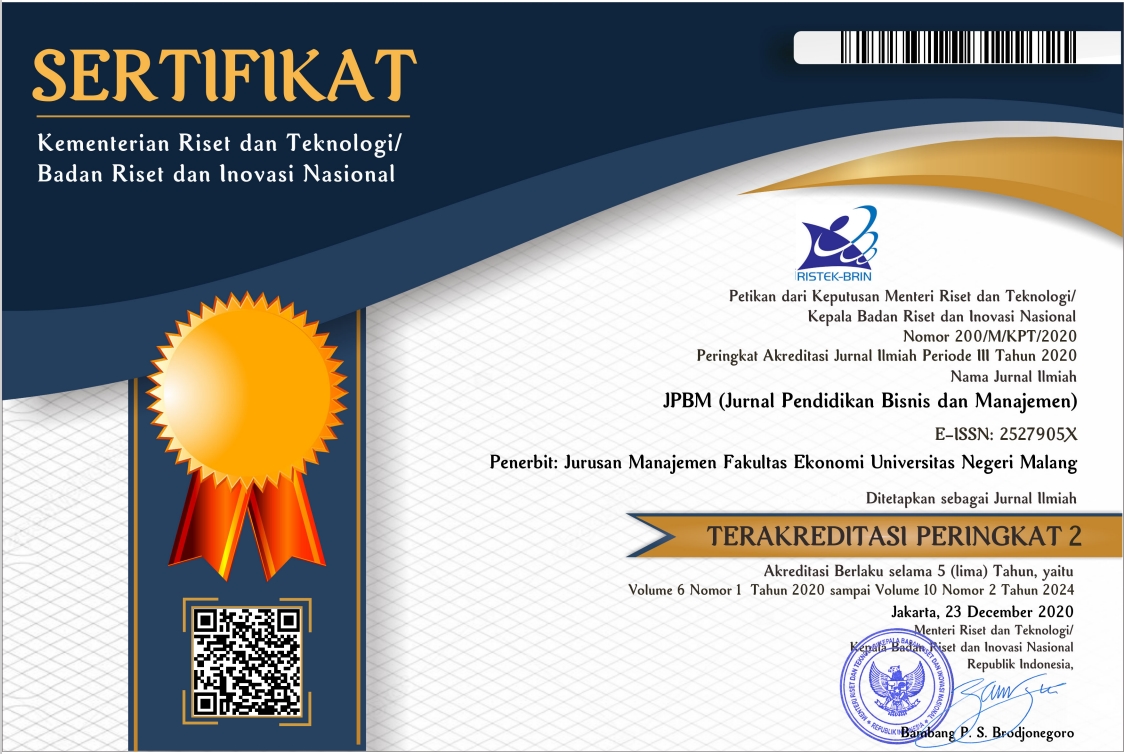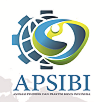The Nexus Between Academic Culture and Collaborative Culture as an Academic Collaborative Culture for Effective Teaching in Higher Education
Abstract
It becomes a challenge for lecturers to provide services to the community through a culture of collaboration that makes it easier for academics to make their contribution to society. This study aims to investigate the relationship between academic culture and collaborative culture as a collaborative academic culture for effective teaching in higher education. This study involved 35 lecturers as respondents in this survey from five universities in Indonesia. A Likert scale was used to collect data from an online survey using Google Forms, and Smart-PLS was applied to evaluate the data. The findings of the study indicate that this climate must be cultivated so that a culture of academic collaborative is achieved optimally. The two concepts are understood implicitly but remain a unity and an interaction that is not confusing in implementation to study the dynamics of institutional behavior and encourage or manage effective teaching improvement.
Keywords: Academic collaborative culture, effective teaching, academic culture
Full Text:
PDFReferences
Blumberg, P. (2012). Learner-centered teaching: Putting the research on learning into practice. Journal of the Scholarship of Teaching and Learning, 12(1), 93–94. https://doi.org/10.21225/d57c7q
Bridges, D., Davidson, R. A., Odegard, P. S., Maki, I. V, Bridges, D., Davidson, R. A., Odegard, P. S., Ian, V., & Odegard, P. S. (2011). Interprofessional collaboration: three best practice models of interprofessional education. Taylor & Francis (Routledge)., 2981, 6–8. https://doi.org/10.3402/meo.v16i0.6035
Carnell, E. (2014). Conceptions of effective teaching in higher education: Extending the boundaries. Teaching in Higher Education, 12(1), 25–40. https://doi.org/10.1080/13562510601102081
Carpenter, D. (2015). School culture and leadership of professional learning communities. International Journal of Educational Management, 29(5), 682–694. https://doi.org/10.1108/IJEM-04-2014-0046
Chong, W. H., & Kong, C. A. (2012). Teacher collaborative learning and teacher self-efficacy: The case of lesson study. Journal of Experimental Education, 80(3), 263–283. https://doi.org/10.1080/00220973.2011.596854
Datnow, A. (2011). Collaboration and contrived collegiality: Revisiting Hargreaves in the age of accountability. Journal of Educational Change, 12(2), 147–158.
de Jong, L., Meirink, J., & Admiraal, W. (2019). School-based teacher collaboration: Different learning opportunities across various contexts. Teaching and Teacher Education, 86, 1–12. https://doi.org/10.1016/j.tate.2019.102925
Degeng, I. N. S. (2017). Effect of ability grouping in reciprocal teaching technique of collaborative learning on individual achievements and social skills. International Journal of Evaluation and Research in Education (IJERE), 6(3), 216–220. https://doi.org/10.11591/ijere.v6i3.pp216-220
Dillenbourg, P. (1999). What do you mean by “collaborative learning”? Cognitive and Computational Approaches, 1, 1–19.
Direktur Jenderal Pendidikan Tinggi. (2020). Kebijakan Pendanaan Pemerintah untuk Pendidikan Tinggi. Kementerian Pendidikan dan Kebudayaan.
Edwards, R. (2018). An elaboration of the administrative theory of the 14 principles of management by Henri Fayol. International Journal for Empirical Education and Research, 1, 41–52. https://doi.org/10.35935/edr/21.5241
Evans, C. (2013). Making sense of assessment feedback in Higher Education. Review of Educational Research, 83(1), 70–120. https://doi.org/10.3102/0034654312474350
Ezekoka, & Gertrude, K. (2015). Maximizing the effects of collaborative learning through ICT. Procedia - Social and Behavioral Sciences, 176, 1005–1011. https://doi.org/10.1016/j.sbspro.2015.01.571
Ferguson, P. (2011). Student perceptions of quality feedback in teacher education. Routledge, 2938. https://doi.org/10.1080/02602930903197883
Gat, Edi, A., Dezie, L. W., & Kosasih, W. (2021). The influence of online learning on students ’ academic achievement: Mediated by collaborative learning the influence of online learning on students ’ academic achievement. International Journal of Advanced Trends in Computer Science and Engineering, 10(1), 154–163. https://doi.org/doi.org/10.30534/ijatcse/2021/211012021
Halibas, A. S., Rowena, O. S., & Rolou Lyn Rodriguez, M. (2017). The penta helix model of innovation in Oman: An HEI perspective. Interdisciplinary Journal of Information, Knowledge, and Management, 12, 159–172.
Hamalainen, R., & Vahasantanen, K. (2011). Theoretical and pedagogical perspectives on orchestrating creativity and collaborative learning. Educational Research Review, 6, 169–184. https://doi.org/10.1016/j.edurev.2011.08.001
Hattie, J. (2015). The applicability of visible learning to higher education. Scholarship of Teaching and Learning in Psychology, 1(1), 79–91. https://doi.org/org/10.1037/stl0000021
Henard, F., & Roseveare, D. (2012). Fostering quality teaching in higher education : Policies and Practices. Institutional Management in Higher Education, September, 54.
Hu, C. C. (2020). Understanding college students ’ perceptions of effective teaching. International Journal of Teaching and Learning in Higher Education, 32(2), 318–328. http://www.isetl.org/ijtlhe
Irawatie, A., & Setyawati, M. E. (2019). Understanding Education learning development of character education-based state defense. International Journal of Multicultural and Multireligious Understanding, 6(2), 27–42. https://ijmmu.com/index.php/ijmmu/article/viewFile/602/418
Kahu, E. R. (2013). Framing student engagement in higher education. Routledge, 38(5), 758–773. https://doi.org/10.1080/03075079.2011.598505
Kasmawati, Y. (2019). Pentingnya budaya kolaboratif : Suatu tinjauan literatur. Jurnal Manajemen Strategi dan Aplikasi Bisnis, 2(2), 203–214. https://doi.org/10.36407/jmsab.v2i2.97
Katsamunska, P., & Pagtananan, J. (2012). Polya katsamunska classical and modern approaches to public administration. Academy of Management Journal, 1.
Kettunen, J. (2011). Strategy and quality maps in higher education. US-China Education Review, 8(2), 149–156.
Knight, J. (2013). The changing landscape of higher education internationalisation - for better or worse? Perspectives: Policy and Practice in Higher Education, 17(3), 84–90. https://doi.org/10.1080/13603108.2012.753957
Laal, M., & Laal, M. (2012). Collaborative learning: What is it? Procedia - Social and Behavioral Sciences, 31(2011), 491–495. https://doi.org/10.1016/j.sbspro.2011.12.092
Loes, C. N., Salisbury, M. H., & Pascarella, E. T. (2015). Student perceptions of effective instruction and the development of critical thinking : a replication and extension. Higher Education, 69, 823–838. https://doi.org/10.1007/s10734-014-9807-0
Lutzker, M. A. (1982). Max Weber and the analysis of modern bureaucratic organization: Notes toward a theory of appraisal. American Archivist/Spring 1982, 45(2), 312–320.
Maringe, F., & Sing, N. (2014). Teaching large classes in an increasingly internationalising higher education environment : Pedagogical , quality and equity issues. Springer Science+Business Media, 67(August 2016), 761–782. https://doi.org/10.1007/s10734-013-9710-0
Marzano, J. R. (2012). Teachers Evaluation. Academia-Accelerating the World’s Research.
Muhtaram, A., Sutarsih, C., & Rosalin, E. (2012). Strategi dan hasil kompetisi perguruan tinggi. Jurnal Administrasi Pendidikan, VIV No. 1(April 2012), 1–16.
Nuryanto, A. (2017). Kritik Budaya Akademik Di Pendidikan Tinggi. The Journal of Society & Media, 1(1), 35–42. https://doi.org/10.26740/jsm.v1n1.p35-42
Parveen, F. (2020). Evaluation In the process of ‘ teaching and learning ’ – a research. Journal of Information and Computational Science, 13(12), 81–88. www.joics.net
Peterson, M. W., & Spencer, M. G. (1990). Understanding academic culture and climate. Academic Journal of Social Sciences, 68, 3–18. www.academia.edu/2023626/Understanding_academic_culture_and_climate?
Redes, A. (2016). Collaborative Learning and Teaching in Practice. Journal Plus Education, 16, 334–345.
Reeves, P. M., Pun, W. H., & Chung, K. S. (2017). Influence of teacher collaboration on job satisfaction and student achievement. Teaching and Teacher Education, 67, 227–236. https://doi.org/10.1016/J.TATE.2017.06.016
Cardoso, O., Tavares, C. S., & Carvalho, T. (2020). Structural and institutional transformations in doctoral education social, political and student expectations series editors (G. Neave (ed.)). https://doi.org/doi.org/10.1007/978-3-030-38046-5_13
Santos, P., & Patrício, M. T. (2020). Academic culture in doctoral education : Are companies making a difference in the experiences and practices of doctoral students in Portugal? International Journal of Doctoral Studies, 15, 685–704. https://doi.org/10.28945/4665
Sarmadi, M. R., Nouri, Z., Zandi, B., & Lavasani, G. M. (2017). Academic culture and its role in knowledge management in higher Education system. International Journal of Environmental & Science Education, 12(5), 1427–1434. http://creativecommons.org/licenses/by/4.0/
Sarstedt, M., Ringle, C. M., & Hair, J. F. (2020). Partial least squares structural equation modeling. Handbook of Market Research, September, 1–41. https://doi.org/10.1007/978-3-319-05542-8
Serdyukov, P. (2017). Innovation in education: what works, what doesn’t, and what to do about it? Journal of Research in Innovative Teaching & Learning, 10(1), 4–33. https://doi.org/10.1108/jrit-10-2016-0007
Shakir, M., Coker, M. A., Adam, A., & Decker, A. (2014). Using Henry Fayol’s principles for better classroom management related papers. Public Policy and Administration Research, 4(11), 72–78. http://www.iiste.org/
Shen, X., & Tian, X. (2012). Academic culture and campus culture of universities. Higher Education Studies, 2(2), 61–65. https://doi.org/10.5539/hes.v2n2p61
Varghese, N. V., & Mandal, S. (2020). Teaching–learning and new technologies in higher education: An introduction. In Teaching Learning and New Technologies in Higher Education (pp. 1–15). https://doi.org/10.1007/978-981-15-4847-5_1
Winslow, F. (2021). Principles of management (pp. 124–126).
Yang, R. (2016). Toxic academic culture in international higher education. International Higher Education, 84, 15–16.
Yarime, M., Trencher, G., Mino, T., Scholz, R. W., Olsson, L., Ness, B., Frantzeskaki, N., & Rotmans, J. (2012). Establishing sustainability science in higher education institutions: Towards an integration of academic development, institutionalization, and stakeholder collaborations. Sustainability Science, 7(SUPPL. 1), 101–113. https://doi.org/10.1007/s11625-012-0157-5
Zhu, C., & Engels, N. (2014). Organizational culture and instructional innovations in higher education: Perceptions and reactions of teachers and students. Educational Management Administration and Leadership, 42(1), 136–158. https://doi.org/10.1177/1741143213499253
DOI: http://dx.doi.org/10.17977/um003v8i32022p128
Refbacks
- There are currently no refbacks.
JPBM (Jurnal Pendidikan dan Bisnis Manajemen) is licensed under a Creative Commons Attribution-NonCommercial-ShareAlike 4.0 International License.
JPBM (Jurnal Pendidikan dan Bisnis Manajemen) is abstracted and indexed in :
















